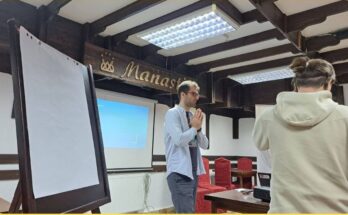Ventotene, 31st August 2022
Key points:
- Chancellor Scholz’s Prague speech of 29 August is a welcome call for the EU’s institutional reform.
- However, Scholz’s approach manifests intergovernmentalism and lacks courage to transform the EU into a democratic federation.
- To achieve this, we need an ambitious treaty change process aligned with the recommendations of the Conference on the Future of Europe.
One cannot help but compare Germany’s Chancellor Olaf Scholz’s speech at Charles University on 29 August 2022 with President Emmanuel Macron’s Sorbonne address in 2017. Add to this the grave political situation in Europe, and the expectations placed on the leader of a strongly pro-European federal government of the EU’s most populous member state are correspondingly high. The choice of Prague as the venue for this important speech, which underlines the membership of central-Eastern European states in the European Community, is very welcome, as is the Chancellor’s very fundamental emphasis on Europe as a peace project that needs to be renewed.
“In this sense, we, as Young European Federalists, welcome the explicit call for institutional reforms and treaty changes”, says Clara Föller, President of the Young European Federalists Germany (JEF Germany). “Yet, while Scholz certainly pointed out a number of legitimate and urgently needed reforms that the EU must apply, the speech had some important shortcomings”, she continues. “The EU’s civic core must be strengthened by giving the citizens, especially young people, more influence in political decision-making processes”.
The unanimity principle in the Council of the EU is the Achilles’ heel of the Union; few things restrict our ability to act as obviously as the national governments. And of course, we explicitly welcome the efforts to abolish this unanimity principle altogether. However, the question of how to overcome disunity between member states to create a basis for institutional reforms in the first place remains unanswered.
Supporting Ukraine in its fight against the Russian invasion and its EU aspirations is of paramount importance. Ensuring a credible perspective of accession to Moldova and Georgia while investing new energy into the enlargement in the Western Balkans is also crucial. Moreover, Scholz goes into remarkable detail on such central issues as the defence of core democratic and rule of law principles in the EU, a common asylum and migration policy, or further efforts in the fight against the climate crisis.
Nonetheless, the picture Scholz paints of the future Europe in Prague is remarkably hazy. Anyone expecting a link to the SPD-Greens-FDP coalition agreement or even the presentation of a Scholzian vision for the future of Europe was disappointed. Even though Scholz clearly advocates institutional reforms verbatim, he surprises us with an alarmingly intergovernmental perspective on how these reforms should be shaped.
“We must realise that any national efforts to respond to the problems of the kind currently faced by Europe can only be of very limited use,” comments Föller and continues: “European cooperation, as repeatedly called for by Scholz, must not be a synonym for further intergovernmentalism. Rather, it is necessary to overcome the logic of nation-state decision-making processes and invest in a common European interest to strengthen European democracy.”
“If we are really committed to the future of Europe, then it is not just the enhanced cooperation of states that we are striving for. It is time to re-shape Europe to achieve a more effective and democratic decision-making based on genuinely valuing citizens’ voice and a central role of the European Parliament” adds Antonio Argenziano, President of the Young European Federalists Europe (JEF Europe).
To fully acknowledge the EU citizens’ voice, we need a treaty change process to implement the proposals of the Conference on the Future of Europe, especially the abolishment of national vetoes in all decision-making. The European Parliament should be strengthened with the right of legislative initiative as well as European elections with transnational lists and the voting age lowered to 16. The Spitzenkandidaten system must be respected in the nomination of the European Commission’s President. Last but not least, a better protection of the EU’s fundamental principles must be ensured for the Union to remain a community of values.
About JEF Europe
The Young European Federalists (JEF Europe) is a political youth NGO advocating for the creation of a democratic European federation as a guarantee for peace, the rule of law and human rights. JEF Europe promotes true European citizenship, works for the widening and deepening of the European Union and strives for a more just and integrated society on the European continent. Established in 1972, the organisation has more than 10,000 activists organised in over 250 national, regional and local sections in 31 countries. The ideals and aims of JEF Europe are defined in the Manifesto of Ventotene, the Political Platform and resolutions adopted by its statutory bodies.
About JEF Germany
The Young European Federalists Germany (JEF Germany) is a non-partisan political youth association that has been advocating for a democratic, citizen-oriented, federal and peaceful Europe for 70 years. We see ourselves as advocates of the European idea and promote the spread of European awareness in society – especially among young people aged 14-35. Founded in 1949, JEF Germany comprises around 4,000 members in regional sections in every German Federal State and almost 100 local sections across Germany. The Manifesto of Ventotene, the Hertensteiner Program of Sept. 21, 1946 and the Political Program as well as a broad number of resolutions adopted by its statutory bodies constitute the basis of its political work.
Previous positions on EU reform
- 2022.06.01 JEF Deutschland statement: “Unsere Forderungen zum Europäischen Jahr der Jugend”
- 2022.05.09 JEF Europe Press statement: From the Convention to the Political Union: time for a federal EU!
- 2022.05.09 JEF Deutschland Pressemitteilung zum Europatag: “Zeitenwende europäisch denken, mit einem Konvent zur Zukunft Europas zur Ausarbeitung einer europäischen Verfassung”
- 2022.04.30 JEF Europe press statement: Citizens want to change the European status quo
- 2022.04.19 JEF Europe & JEF France joint press release: It’s #TimeToChangeEurope: Join the Strasbourg Summit!
- 2021.12.12 Offener Brief: Europawahlen wirklich europäisch machen, jetzt transnationale Listen einführen!
- 2021.11.30 JEF Europe & JEF Germany joint press statement: The new German government has a clear message: Time for a European Federation!
- JEF Europe CoFoE proposals
- 2021.06.01 “Europa muss man heute machen!” – Forderungen der JEF Deutschland an die Koalitionsparteien
Contact information

Antonio Argenziano, President
Young European Federalists
JEF Europe
Rue d’Arlon 53, 1040 Brussels

Clara Föller, President
Junge Europäische Föderalisten
JEF Deutschland e.V
Chausseestraße 84, D-10115 Berlin





